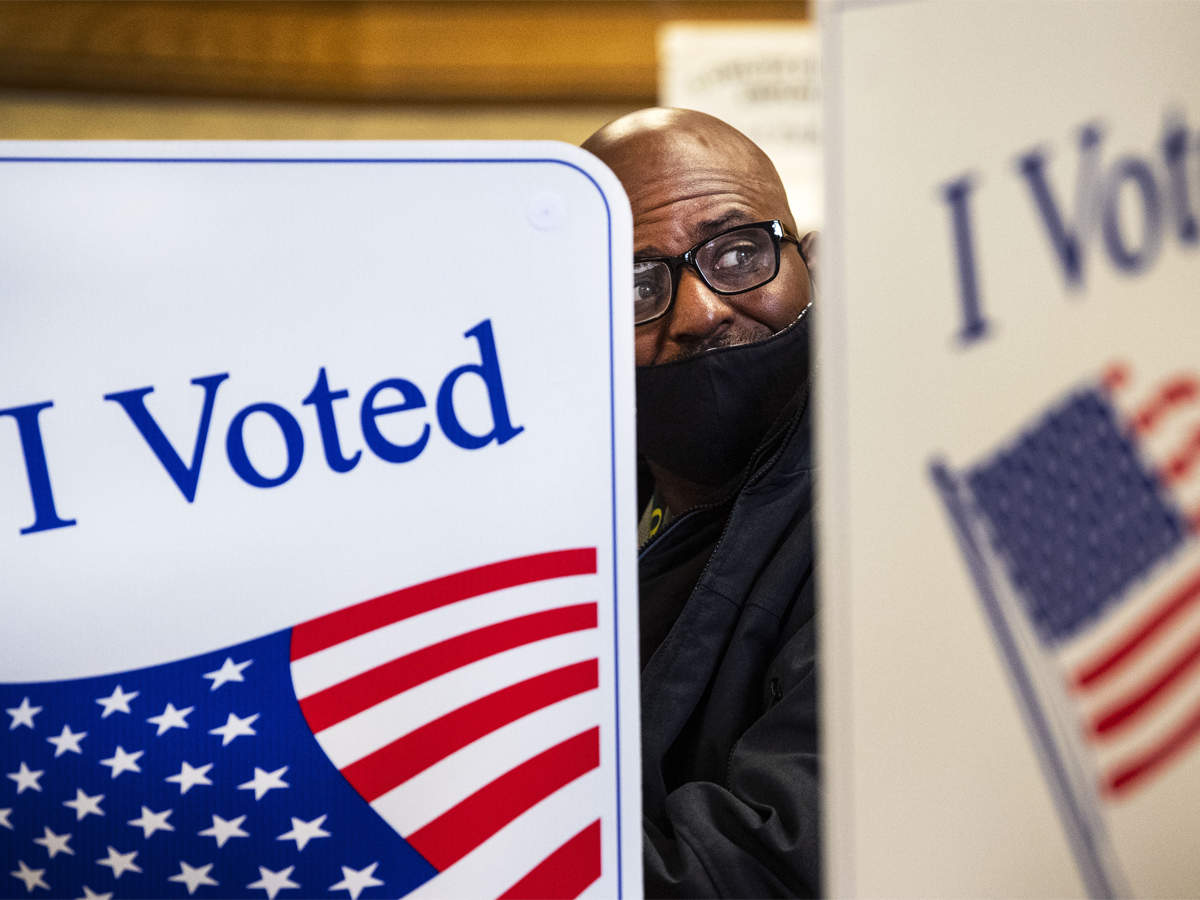On one side are Republicans in state capitols, intent on passing laws curtailing when and where their citizens can vote – citing allegations of voting fraud repeatedly made by Donald Trump in the months after his presidential defeat to Joe Biden.
On the other are Democrats in Washington, DC, who are pushing legislation to take those decisions out of the hands of state politicians by setting federal rules for conducting elections.
At the center of the debate is the question of what is the greatest threat to American democracy. Is it the security of an election process that in 2020 relied heavily on early and mail-in voting?
Or is it a system, corrupted by the influence of big donors and powerful interests, that makes voting more difficult than necessary, particularly for historically disadvantaged groups?
Democrats make their move
On Wednesday night the House of Representatives passed what its supporters have labeled the “For the People Act”.
It represents one of the most expansive federal reforms of the US election system in a generation.
The bill would guarantee that voters can receive a mail-in ballot if requested, mandate a minimum of 15 days of early voting before every federal election, require paper ballots, and set standards for voting machines.
It would prohibit states from disenfranchising felons who have completed their sentences and enact new restrictions on undisclosed so-called “dark money” political contributions.
Many new voters would be automatically registered under the legislation, which also requires technology companies to disclose information about political advertising, create new government support for small donor-funded candidates and seek to end the practice of “gerrymandering” voting maps for partisan advantage.
The House approved the bill by a nearly party-line vote, with one Democrat – Bennie Thompson of Mississippi – opposing because of concerns that the redistricting provision would disadvantage black voters.
Republicans dig in
Republican opposition to the Democratic legislation has been near complete.
House Minority Leader Kevin McCarthy called the bill an “unparalleled political grab” that would consolidate Democratic power.
Former Vice-President Mike Pence, in one of his first public statements since being forced to evacuate the US Capitol after it was attacked by pro-Trump rioters, wrote in an opinion column that the Democratic proposal would “increase opportunities for election fraud, trample the First Amendment, further erode confidence in our elections and forever dilute the votes of legally qualified eligible voters”.
During his Sunday speech at the Conservative Political Action Conference in Florida, Donald Trump was his typical blunt self. He called the bill a “monster” that “cannot be allowed to pass”.
Election security – frequently anchored on the unfounded belief that Trump’s November defeat was the result of widespread fraud – was a regular topic of conversation at the weekend CPAC gathering. The conference featured seven panels on voting measures, and most included participants who sharply criticized the House legislation.
The Senate’s turn
With the Democrat-controlled House passing the For the People Act, the bill now moves to the Senate, which must also approve the legislation if it is to reach President Joe Biden’s desk and be signed into law.
Unlike two years ago, when House passed a similar set of reforms only to be ignored the Senate, the upper chamber of Congress is now controlled by Democrats. That doesn’t mean, however, that the outlook for the bill is any brighter.
Standing in the way is the Senate’s filibuster rule, which requires 60 votes for most major pieces of legislation. With only 50 Democrats, the bill’s proponents will have to find 10 Republicans to join their cause. That, to say the least, is a daunting task.
Some provisions, like congressional redistricting reform and federally mandated mail-in balloting guidelines, are non-starters. The 791-page House bill is chock full of the provision of varying levels of contentiousness, and Senate Republicans will methodically pick them apart.
That has some Democrats talking about scrapping the filibuster entirely and allowing the legislation to be approved by a simple majority vote. That would require the approval of all the Democrats, however, including two – Joe Manchin of West Virginia and Kyrsten Sinema of Arizona – who have said they oppose ending the filibuster.
That may not stop Senate Democrats from trying, especially if Republicans continue to block election reforms.
“You bring it to the floor a few times and you let them obstruct it and you see what effect bad-faith obstruction has on some members’ views about the filibuster,” Rhode Island Senator Sheldon Whitehouse said.
A Trump-inspired state-level push
Behind the Democratic urgency in Congress to pass voting reforms is the reality that they’re in a race with legislatures in 43 states currently moving legislation that curtails the same voting processes and systems that the For the People Act seeks to mandate.
In Georgia, for instance, the statehouse approved a bill on Monday curtailing the use of drop boxes for ballot returns, requiring photo identification to vote by mail and ending early voting on Sundays, when many black churches – which tilt toward the Democrats – organize get-out-the-vote drives.
Wisconsin has legislation with similar elements and would prohibit election officials from correcting absentee ballots that had missing voter information.
Other states are considering new limits on same-day voting registration, requirements to show proof of citizenship to register, earlier postmark deadlines for mailed ballots, and purging the election rolls of inactive voters who don’t respond to verification efforts.
Republicans frame these as common-sense measures to protect against fraud and ensure that Americans have faith in the electoral process. Democrats counter that the confidence of the public has been damaged by the unsubstantiated allegations made by Trump and others after November’s balloting.
A high-stakes fight
When it comes to a showdown between states and the federal government over the rules of the election game, the US Constitution says the latter wins. That won’t prevent a spate of lawsuits challenging the legality of the federal legislation if the congressional Democrats succeed in getting their bill passed by the Senate.
Just this week, the Supreme Court heard arguments in a case that pits the Democratic and Republican parties against each other over the application of the Voting Rights Act of 1965 in Arizona. One of the issues in the case, a state ban on the collection of mail-in ballots by third parties, would be directly addressed by the For the People Act.
Washington is no stranger to high-stakes political battles. Most sessions of Congress, particularly early in a new presidential administration, feature more than a few legislative showdowns touted for their potential long-term implications.
This one is a fight over how elections are conducted and – consequently – who is around to participate in all the other political battles to come.
The stakes don’t get much higher than that.
Courtesy: BBC










